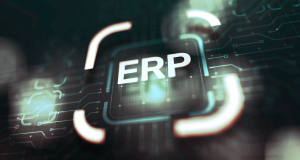Hi everyone and welcome to a brand-new episode of Birlasoft, very own podcast, Tech Lyceum, coming from the BMarc manufacturing series. Now the topic on this podcast is fast track, your digital transformation journey with intelligent ERPs. How do you do that? Well, I've got two guests to tell us all about it. First up is Paul Menig. He's no stranger to tech lyceum. In fact, he has become somewhat of our resident speaker, and we're so excited to pick his brain once again on this podcast. Paul Menig is a thought leader and a Senior Principal Consultant at birlasoft Corp marketing. Now, Paul has vast experience across many, many industries, including manufacturing, medical, defense, aerospace and transportation. Now to tell you a little bit about our new guest on the show. We've got Arijit Maitra now. Arijit is currently the head of integrated enterprise solutions business unit at birlasoft, with nearly three decades of experience at enterprise application that's CRM and ERP for you and digital area spanning across delivery, business and competence management. Arijit has led numerous client engagements to drive accelerated business transformation and enhance outcomes by strengthening the core business functions with IT enablers. I can think of no two people better suited for this topic. Paul, Hello, welcome to the show once again.

Neerja, it's great to be here again and have an opportunity to talk about how to make your business successful.
That's fantastic. And Arijit, the first timer on Tech Lyceum, Welcome to the show.
Yes, indeed, Neerja. Thank you very much. Very excited to be here, looking forward to a great discussion.
Super now, first question coming at you, Paul, looking at the journey of ERPs, transitioning from systems of record to systems of innovation.
Q: What exactly are intelligent ERPs, and how is it acting as the backbone for enterprise digital transformation for manufacturers?
Well, let's start today's business is more competitive, and it needs what are called intelligent ERPs to be able to support robust decisions with real time, accurate information that's provided by mining the data using conversational artificial intelligence queries, robotic process automation and machine learning. The focus is on the entire enterprise, the resources and forward planning to be able to deliver high levels of customer satisfaction, meet compliance requirements around the world and create profits for investors. With its extensive record of everything in the business, from the finances to human resources, to customer relations, to production, you can drive more informed decisions quickly and generate opportunities for innovation. One of those opportunities comes from the trend toward headless e commerce, including buying cars online now, the automotive clients I work with use predictive diagnostics enabled by the intelligent capabilities of ERPs, to inform a customer when something is likely to need attention based on more than just mileage or hours. The customer is informed in advance of a problem, the dealership is informed parts are placed on order and appointments made. Now that beats the time I was stuck on the side of the road when the driveline in my car dropped. Analyzing data in the intelligent ERP creates opportunities to build new business models automotive companies may provide insurance based on details of driving behavior from the embedded sensors and telematics going well beyond what insurance companies can do. The auto companies have the information using hundreds of data scientists skilled in artificial intelligence and machine learning, they are innovating to find more ways to offer additional services to their customers,
Right, that sounds very interesting Paul. And Arijit, maybe you could add to that about what the specific you know,
Q: Few trigger points manufacturers should make note of to realize that it's time to modernize their legacy ERP systems, or in other words, when is the right time to switch to intelligent ERPs?
Certainly Neerja. Look , we have seen from our experience that traditional ERPs are no longer able to support the changing needs for industry disruption, and many startups actually challenge. Changing them with their agility and newer business models. We all have seen that. We also have also that most of our customers today are looking for shorter time to go to market. They expect a very quick reaction to the customer needs and, of course, a futuristic Outlook to drive a better business outcome. And honestly, to their frustration, I think most of them are finding their current ERP applications are unable to cater to such needs, and hence, I think this is a time when they start thinking, Well, it's time to switch to new ERP solution and maybe, maybe leverage the strength of analytics, CPS, AML and Iots for better decision making. One of our logistics conglomerates, they're finding it very difficult to have an end to end visibility of shipments across their customers, partners and vendors, and they also had a challenge to maintain a single version of truth across multiple business line on a real time basis. To address that, we have implemented a cloud based ERP solution, along with customers, CX model and IoT. If I have to quote another example, for one antibody production company in Europe, we have implemented a new ERP solution to address their country specific governance and compliance requirements, which Paul also just spoke about as one the critical business drivers. In fact, as we speak, we just have concluded another cloud based ERP transformation deal for a major manufacturer company Middle East, to replace the legacy ERP application, which is not able to scale up against very volatile market situation. So these are the few example I could think of. But there are also many other compelling business needs. For example, a strange supply chain, ecosystem, ineffective process or bottleneck in the current system are also good enough reasons to switch to a new generation of ERP.
Okay, Excellent. Thanks so much, Arijit, for those points. Paul, coming back to you,
Q: What do you think the first step should be that manufacturers take in this business value driven journey of implementing intelligent ERPs.
Thank you. Neerja, upgrading an existing ERP or installing a new one is a fantastic opportunity to do some business process re-engineering. Additionally in mergers and acquisitions M and A scenarios, there is a need to merge data from multiple ERPs. Now, moving from legacy to intelligent ERP is a big transformational change that demands attention to organizational change management. This is the time to put together a highly functioning, dedicated, cross functional team of people, including business process champions and ERP consultants with a track record of success, the effort needs to focus on the business needs, not the needs of one department or another. We focus on the needs of the business with knowledge of the many options offered by vendors here at Birlasoft, using our assessments for digital maturity and the implementation readiness, a new ERP is a big task for companies with many risks if mistakes are made, consider looking at some specific use cases and map how they are done today and consider how they could be done in the future. With a more powerful ERP an envisioning phase can help determine what things are required, what are desirable and what are nice to have, but not essential. Recognize that you can tailor newer ERP platforms without having to have people creating and maintaining custom software. One key I see is cleansing and updating legacy data. As you move forward, the new data needs to be much richer than the legacy data. You'll need to figure out how and when to augment the old data.
Okay, great. Paul, transformations are inevitable, but it's nice to know how to be prepared for them. So thanks for sharing that. Arijit, the last question coming to you,
Q: Are there any specific timelines or any KPIs manufacturers should measure to gain maximum value out of their intelligent ERP investment business projects,
Yes, indeed, Neerja. Right. As I stated earlier, it's always prudent for manufacturers to create their ERP journey roadmap first, right, and make sure that it's driven by both business and it together. That's the key thing. As I've often seen an IT initiated and owned ERP implementation may not actually always harness the real benefit. Therefore, I would always suggest at the outset, there should be very clearly stated business objectives defined to be realized in a time bound manner. Now, with regard to your question, on timeline, right? Typically, modern days, cloud ERP. Limitation. Time Frame may vary from six months to 18 months based on the size and the complexity of the program. Sometimes it can be even multi year roll out as well. Coming to the point of KPIs here at Birlasoft, we have been working with many customers to implement or enhance their ERP applications, and either introduced many KPIs or has helped them to improve their existing APIs? If I have to really name some of them, typically, they would be faster time to market, to introduce a new product, enhance customer and supply experience through integrated demand, supply visibility, Profitability and Cost reduction. So important right then? Inventory cycle ratio, perfect, order rate, po tracking, I can name a whole lot for one of our EU customer by implementing the new ERP system, we're able to significantly streamline their disparate data sources, which Paul hinted right, and reduce book closure time by more than 90% similarly, partnering with one of the leading global manufacturers of engines and turbocharges were able to reduce ERP implementation time by almost 40% let's say, and with significant cost savings. Actually standard is more than 70% of the common business processes. So net, net, I would suggest, before embarking on any major ERP transformation journey, manufacturers, along with their SI Partners, should clearly identify critical KPIs and see whether the new ERP package is capable of tracking and reporting there.
Okay, super Thank you. Arijit, I think that's a very thorough checklist for manufacturers, and with that, we come to the end of this episode, and I think you know to sum it up, intelligent, ERP transforms your organization into a smart one with multitudes of knowledge and business opportunities, so that you can stay ahead of the competition, but make sure enough homework has been done and prepare your workforce for the change. I think Paul and Arijit have certainly illustrated this for us with their words. Thank you so much once again, Paul and Arijit for sharing your thoughts today.
It's been great. Neerja, thank you.
Thank you, Neerja. Yeah, great to hear.




